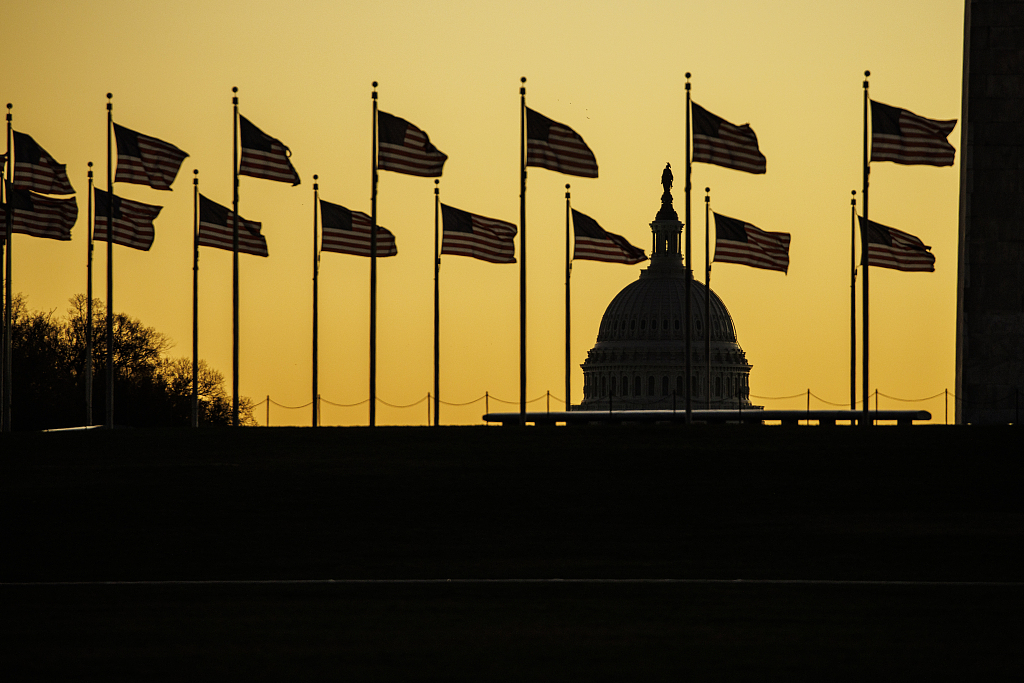
An airplane flies over the roof of Taipei 101, in Taipei, China's Taiwan region, October 17, 2019. /CFP
An airplane flies over the roof of Taipei 101, in Taipei, China's Taiwan region, October 17, 2019. /CFP
Editor's note: Zhang Hua is a research fellow at the Institute of Taiwan Studies of the Chinese Academy of Social Sciences. The article reflects the author's opinions, and not necessarily the views of CGTN.
On December 23, U.S. President Joe Biden signed the "National Defense Authorization Act (NDAA) for Fiscal Year 2023" which includes a number of negative provisions related to China. Among them, the most concerning one is that the United States will provide China's Taiwan region with "$10 billion in security aid in the next five years" and "the United States will send federal employees to work at Taiwan region's legislative and executive branches through a fellowship program."
Some of the Taiwan authority officials are very excited about the Taiwan-related content of the 2023 U.S. NDAA, claiming that it demonstrates "the high priority the United States attaches to Taiwan's security" and "the firm position of U.S.-Taiwan cooperation." The island's pro-Democratic Progressive Party (DPP) media and political commentators have initiated a public opinion campaign, distorting it into the fact that the United States will provide $10 billion "in free aid" to the Taiwan region. Is this really the case?
As we all know, the $10 billion provided by the U.S. is not for developing the island's economy or improving people's livelihood in Taiwan, but for purchasing American weapons. In recent years, the U.S. has been selling a large number of weapons to the Taiwan region every year, for which the island has paid tens of billions of dollars. It has never been heard that Taiwan defaulted on military purchase funds. On the contrary, it is the United States that keeps delaying the delivery of arms to the Taiwan region. So why does the U.S. still provide military financing to Taiwan?

The U.S. Capitol dome is seen past the base of the Washington Monument as the sun rises in Washington, D.C., November 9, 2022. /CFP
The U.S. Capitol dome is seen past the base of the Washington Monument as the sun rises in Washington, D.C., November 9, 2022. /CFP
The Americans have a good calculation. In terms of economic interests, the U.S. can not only lock in the profits from the arms sales to Taiwan in advance, but also get a huge amount more in interest on the loan. According to the act, the $10 billion military financing is not free, not even without interest. While the exact interest rate and the guarantee the Taiwan region provides for this remains unknown, it's a known fact that Taiwan has to pay off within 12 years.
Besides, the U.S. military financing is predicated on an annual increase in the Taiwan region's defense budget, which means that Taiwan has to allocate more funds to buy U.S. weapons, a "promotional tactic" that is not new in business.
In strategic documents such as the U.S. National Security Strategy, the U.S. already regards China as its top strategic competitor, and it sees China's Taiwan island as a leverage that can help it gain strategic advantage over China. In terms of political interests, the U.S. military financing for Taiwan can effectively incorporate the region into the U.S. Asia-Pacific strategic system, tie it firmly to the U.S. chariot, and make it a frontline pawn for the U.S. to contain China in the Asia-Pacific region.
In addition, the act also sets up the "Taiwan Fellowship Program" in which the U.S. will send federal employees to work at the Taiwan authority's executive and legislative branches. These U.S. officials will become the "overlords" of Taiwan officials, thereby strengthening the U.S. control over the island across the board. This seems to be something that even the DPP authorities, who want to "rely on the U.S. to resist Beijing," do not want to see.
It must be emphasized that the $10 billion military financing for Taiwan island over five years will not change the asymmetric military relations across the Taiwan Strait, and the Taiwan region will still be at an absolute disadvantage in terms of the military power vis-a-vis the Chinese mainland. Moreover, the U.S. military financing does not mean a shift in the U.S.'s commitment to the Taiwan region.
On the contrary, such provocative "support for Taiwan" voiced by the U.S. will only trigger stronger reaction by the Chinese government who would marshal greater combat power and stronger will to defend its national sovereignty, security and development interests. From this perspective, Taiwan will not become more secure; instead, it only puts itself in a more perilous situation.
(If you want to contribute and have specific expertise, please contact us at opinions@cgtn.com. Follow @thouse_opinions on Twitter to discover the latest commentaries in the CGTN Opinion Section.)